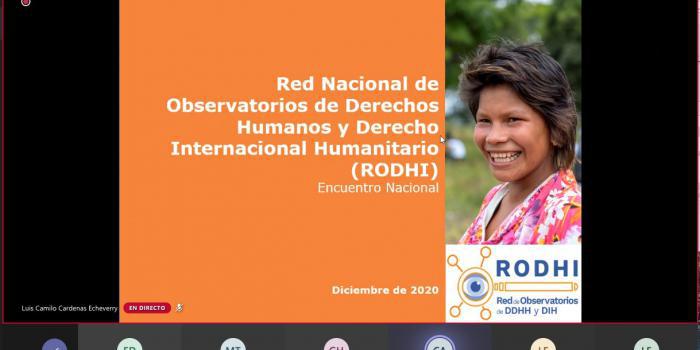
Unit participated in a national event of the Network of Human Rights and IHL Observatories (RODHI)
This Network is an inter-institutional body that promotes coordination for the exchange of information, methodologies and structural and conjunctural analyzes on human rights violations and infractions of international humanitarian law.

Within the framework of the week for human rights, in a virtual way, the director of the Unit for Comprehensive Attention and Reparation to Victims, Ramón Alberto Rodríguez Andrade, was part of the meeting of the Network of Observatories for Human Rights and IHL (RODHI), in which the Presidential Council for Human Rights of the Presidency of the Republic, national institutions, RODHI observatories throughout the country and other interested parties participated.
In this strategy, which ensures the guarantee and respect for human rights throughout the territory, territorial nodes have been created in: Nariño, Cauca, Chocó, Antioquia, Norte de Santander, Bogotá, Meta, Santander and Caribe (Atlántico, Bolívar, Córdoba and Magdalena). These nodes are made up of territorial observatories of civil society, academia and government, and a collaborative work has been carried out in which the situation of DD is monitored. H H. in each of these departments.
Director Ramón Rodríguez said that the Unit has accompanied the activation of the territorial nodes, “from the Sub directorate of the National Information Network, guidelines have been given for the consolidation and exchange of information between the node's observatories, strengthening processes have been supported from the thematic themes of the Victims Unit on topics such as: ethnic approach, differential approach, management of the entity's platform, management of databases”. "Likewise, channels have been activated with the entity's allies to strengthen the RODHI observatories with information, methodologies and analysis", he added.
Rodríguez assured that the entity has supported “with our links in the territory the incidence of the territorial nodes of the Network in the decision-making spaces, taking into account that this is one of the main objectives, that the analyzes carried out in the RODHI framework serve for adequate decision-making in matters of prevention, protection, guarantees of non-repetition, victims, human rights, and among others”.
The director highlighted that the Victims Unit in 2020 has been leading the implementation of pillar 8 of the Action Plans for Regional Transformation (PATR) in the territories, within this framework, 12 PDET initiatives related to the formation of observatories for which "from the Unit within the framework of the RODHI we have presented and developed a methodology for technical and methodological support to the territorial entities that defined these initiatives".
According to the director, at the Unit for Comprehensive Attention and Reparation to Victims “we will remain committed to the implementation of this strategy, convinced of the benefits of networking and that human rights observatories (both social, academic and governmental) they are essential for generating the inputs and analyzes that allow making correct public policy decisions”.
(Fin/DFM/LMY/AEB)






